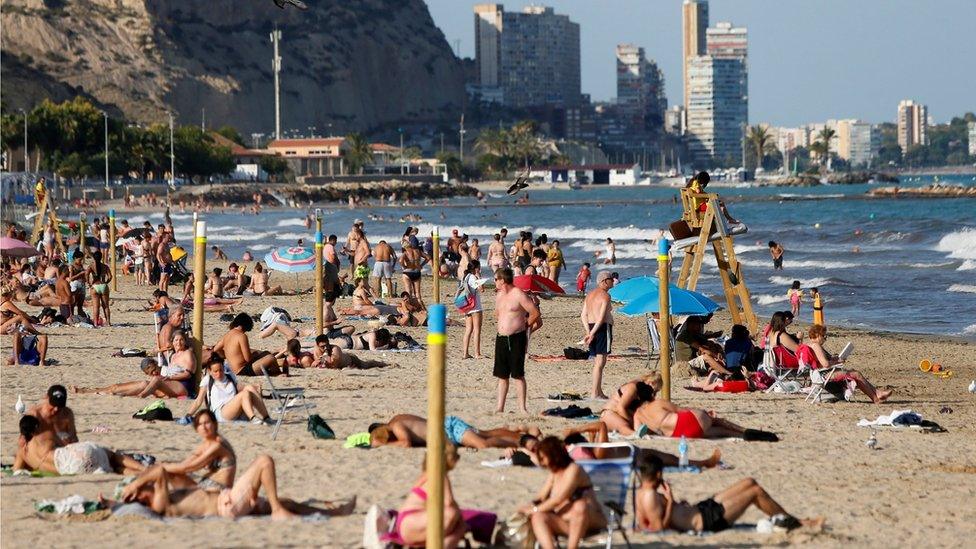Covid in Scotland: Second wave reignited by summer holidays
- Published
- comments

The report said many cases originated outside the UK, mainly from travel to Europe over the summer
The origins of many of the second wave of Covid infections in Scotland can be traced to countries outside the UK, a new expert report has said.
At the daily media briefing Prof Jason Leitch, Scotland's national clinical director, said the lockdown eliminated the majority of the first wave strains.
He said the report demonstrated that whole new strains were then introduced.
The report said many cases could be traced to summer holidays and other travel abroad in July and August.
First Minister Nicola Sturgeon said it highlighted the role of travel in "reigniting outbreaks of the virus after it has been suppressed".
The new reports, external were written for the UK government's Scientific Advisory Group for Emergencies (SAGE) by members of the COG-UK Consortium.
By studying the genomic history of Covid they confirmed about 300 different strains were detected in Scotland during the first wave.
Prof Leitch said the report showed that the March lockdown, which lasted until the start of July, was successful in "all but eliminating" the virus.
Allow X content?
This article contains content provided by X. We ask for your permission before anything is loaded, as they may be using cookies and other technologies. You may want to read X’s cookie policy, external and privacy policy, external before accepting. To view this content choose ‘accept and continue’.

However, the study identified travel to Europe as a major trigger for the second wave.
It estimated that between 17 July and 30 August, there were 46 "import events" into Scotland - 28 from England, 13 from mainland Europe and four from Asia.
However, an estimate of the relative impact of those events led the researchers to believe it was European "lineages" that led to the most spread of the virus.
The report said: "Interestingly, by this measure it was imports from Europe (16%) rather than England (8%) that contributed more to the subsequent number of Scottish sequences over the summer and onwards."
Prof Leitch said: "This report allows us to say that the lockdown in the first part of the year, that you all played such a huge part in, did get Scotland incredibly close to eliminating the virus in our communities.
"But as we opened up, inevitably, people began to travel across the UK, internationally on summer holidays and other travel abroad, new strains were imported again into Scotland."
New Zealand-style ban
Prof Leitch said that scenario "will always be the case" unless Scotland introduces a New Zealand-style travel ban.
On the lessons of the report, he said: "We have learned that once as a society we are allowed to travel again, we brought fresh new strains into Scotland which started our second wave.
"In some cases from countries where incidences of the virus was not high enough to be on quarantine lists or from other parts of the UK where there is, of course, no quarantine."
A separate study focuses on Wales, which Prof Leitch said has a "very similar Covid history" to Scotland.
Prof Leitch said the reports would inform decision making on areas such as quarantine lengths and airport testing.
'Stay local'
He added: "These reports also provide a cautionary tale to people who are considering travelling over the Christmas period.
"In an ideal world we would encourage everyone to stay as local as possible and, particularly, not to travel between high and low prevalence areas.
"If you can stay local you will help Scotland to avoid another spike in January."

